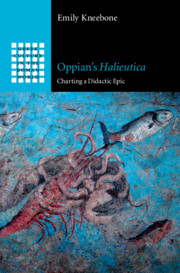Book contents
- Oppian’s Halieutica
- Greek Culture in the Roman World
- Oppian’s Halieutica
- Copyright page
- Epigraph
- Contents
- Acknowledgements
- Introduction: On Fishing
- Part I Didactic Poetry
- Chapter 1 Didactic Epic
- Chapter 2 Knowledge and Pleasure
- Chapter 3 Mapping the Sea
- Part II Morality at Sea
- Part III Humans and Animals
- Part IV The World Is a Sea
- Bibliography
- Subject Index
- Index Locorum
Chapter 1 - Didactic Epic
from Part I - Didactic Poetry
Published online by Cambridge University Press: 24 September 2020
- Oppian’s Halieutica
- Greek Culture in the Roman World
- Oppian’s Halieutica
- Copyright page
- Epigraph
- Contents
- Acknowledgements
- Introduction: On Fishing
- Part I Didactic Poetry
- Chapter 1 Didactic Epic
- Chapter 2 Knowledge and Pleasure
- Chapter 3 Mapping the Sea
- Part II Morality at Sea
- Part III Humans and Animals
- Part IV The World Is a Sea
- Bibliography
- Subject Index
- Index Locorum
Summary
Didactic poetry has fallen firmly out of favour as a contemporary genre: it is a literary form rarely used by modern authors and seldom read by the twenty-first-century public. A remark in Shelley’s preface to Prometheus Unbound (1820) offers one enduring explanation for its demise: ‘Didactic poetry is my abhorrence; nothing can be equally well expressed in prose that is not tedious and supererogatory in verse.’ Why write in verse, the argument runs, if one aims at clarity and pedagogical precision; conversely, why aim to communicate factual information if one values sublimity and the poetic imagination? A technical manual in verse fits the perceived role of neither poetry nor prose.
- Type
- Chapter
- Information
- Oppian's HalieuticaCharting a Didactic Epic, pp. 25 - 43Publisher: Cambridge University PressPrint publication year: 2020

